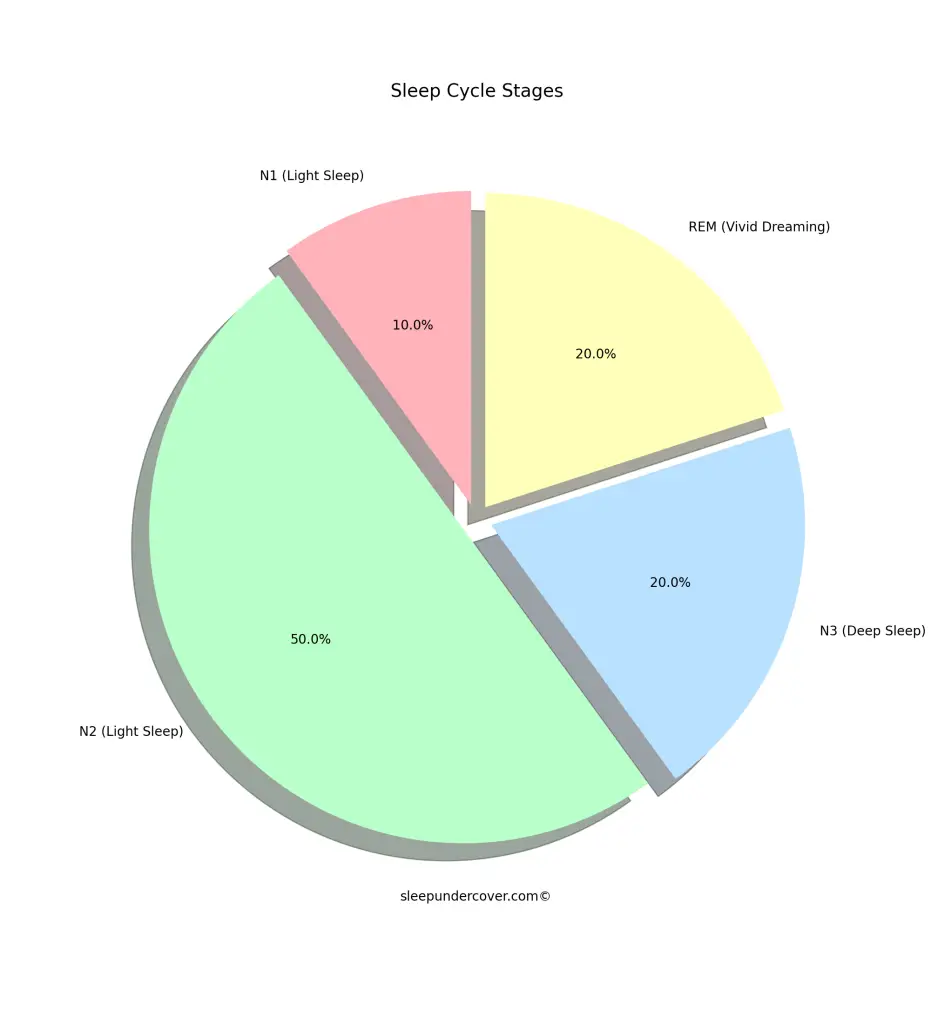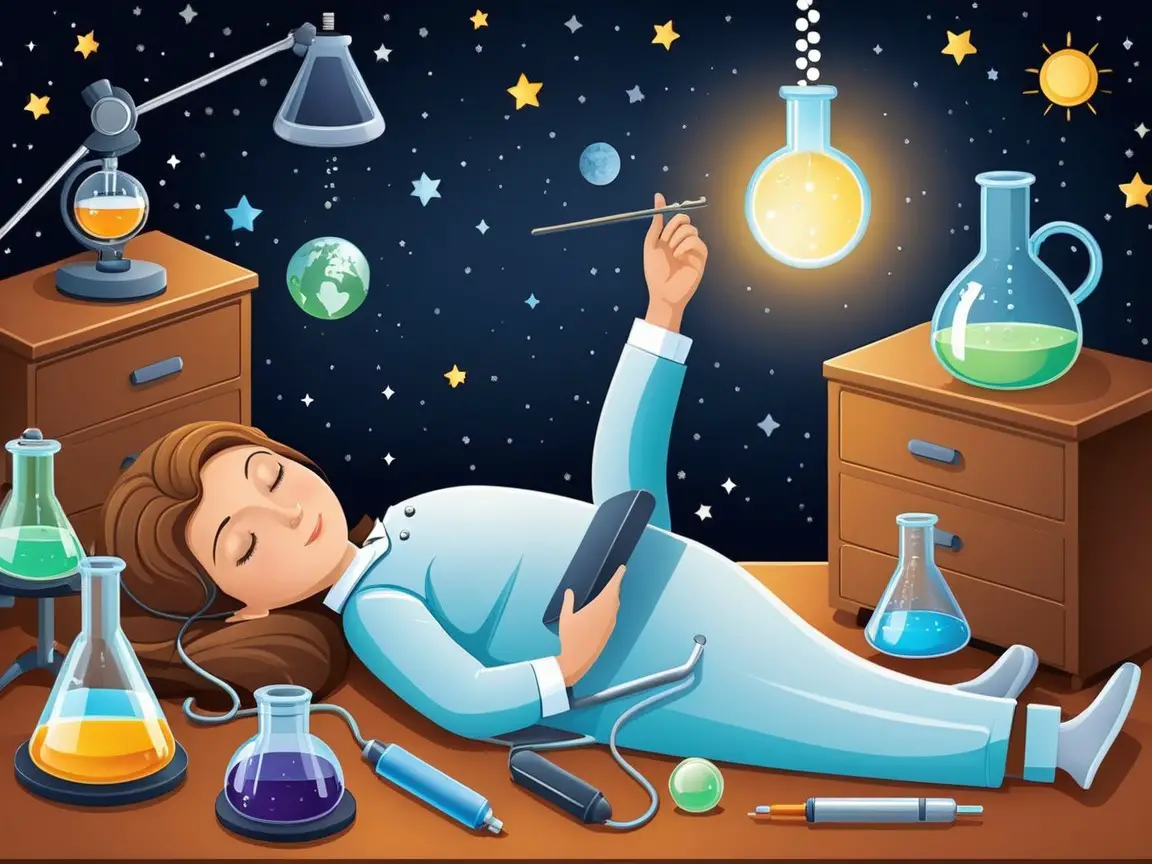We all know sleep is crucial. But have you ever considered what happens during slumber? Understanding how sleep works helps you prioritize those Zzz’s. It’s more than just feeling rested; it’s about enabling vital bodily and brain functions impacting your well-being.
Table of Contents:
The Science Behind Sleep
While the exact reason *why* we sleep remains a mystery, scientists have made incredible sleep science discoveries1 about what happens when we close our eyes. Brain wave activity slows within a minute of falling asleep. Our body temperature, heart rate, and breathing decrease.
This isn’t a static process. We cycle through sleep stages during the night, orchestrated by our brains. This nightly cycle influences our sleep patterns and overall sleep health.
The Stages of Sleep: A Symphony of Slumber
Imagine a symphony with restful movements and faster ones. Our sleep stages transition similarly over multiple sleep cycles. Each cycle lasts 70-120 minutes, repeating 4-5 times nightly.
Four main stages are categorized into two groups: Non-REM (NREM sleep) and REM (rapid eye movement) sleep. The timing and quality of these stages heavily influence sleep therapy outcomes.
| Category | Stage | Other Names | Typical Length |
|---|---|---|---|
| NREM | 1 | N1 | 1-5 minutes |
| NREM | 2 | N2 | 10-60 minutes |
| NREM | 3 | N3, Slow-Wave Sleep (SWS), Delta Sleep, Deep Sleep | 20-40 minutes |
| REM | 4 | REM sleep | 10-60 minutes |

Non-REM sleep (NREM sleep), stages 1, 2, and 3, progressively deepens. The Cleveland Clinic explains2 these stages begin after the initial light stage. Muscles relax, and heart rate slows. Then in N3 (deep sleep), growth hormone releases, vital for repairing muscle wear and tear from daily activity.
Growth hormone offers several long-term physical and cognitive benefits. This deep sleep is essential for muscle recovery and overall health. This is a time of reduced brain wave activity, promoting restful sleep.
After deep sleep, we transition into REM sleep. Heart rate increases, and brain activity surges, creating vivid dreams. This stage lacks the paralysis seen in other stages, avoiding a sleepwalking-like experience. Specific brain waves characterize REM sleep, distinguishing it from other sleep stages.
Initial sleep cycles emphasize Stage 3 deep sleep for bodily repair. Later cycles have longer REM sleep periods, consolidating learning and memory.
How Sleep Works: The Body’s Internal Clock
Two systems dictate sleep and wake times. Understanding how sleep works means appreciating their balance. These mechanisms manage our sleep cycle and influence circadian rhythms, impacted by various sleep disorders.
- Sleep-wake homeostasis: Sleep drive strengthens with each waking hour, increasing sleep pressure. Your circadian rhythm and sunset time influence tiredness.
- The Circadian Rhythm: The National Sleep Foundation3 describes this 24-hour biological clock. It responds to daylight, increasing sleepiness as light diminishes. It also affects sleep apnea, making a CPAP machine essential for some individuals.
Internal and external factors, like stress, hunger, caffeine, and screen time, influence these systems. They affect our sleep patterns and can disrupt circadian rhythms, sometimes leading to sleep deprivation.
This highlights the brain’s role in sleep regulation. It demonstrates how intricate sleep science is and its connection to our overall well-being. Further research continues to uncover how brain waves contribute to different sleep stages and how they are affected by factors such as light exposure.
There’s more to discover about how sleep works, like brain regions, signaling molecules, and body homeostasis. This complex interplay impacts our sleep quality and overall health.

Why Quality Sleep Matters: Benefits for Body and Mind
Sleep is not mere “downtime.” Sleep deprivation has serious consequences. It’s not about a specific number of hours but achieving healthy sleep patterns.
Inadequate sleep increases the risk of diabetes, high blood pressure, respiratory issues, weight problems, and cardiovascular disease. As Harvard Health reports4, heart rate and body temperature significantly change during sleep cycles. Disruptions to these cycles, including from obstructive sleep apnea or a faulty CPAP machine, can have adverse health effects.
Sleep deprivation affects cognitive function too. It can cause difficulty focusing, low energy, brain fog, and an overall struggle with daily life.
Understanding How Sleep Works
The National Institutes of Health defines sleep as a rest state alternating with wakefulness. Two key body systems work together, regulated by sleep medicine principles.
Johns Hopkins Medicine describes5 REM (Rapid Eye Movement) sleep with active brain engagement and dreams. The body cycles through REM and non-REM stages multiple times nightly. This creates a contrast between paralysis and full motion throughout each sleep cycle.
Multiple brain parts regulate sleep timing and stage transitions. This involves complex brain wave activity that changes throughout the sleep cycle.
While researchers haven’t fully unlocked how sleep works, this knowledge helps you appreciate sleep’s importance. By understanding sleep stages and brain wave activity, you can take steps to improve your sleep hygiene and address sleep problems, potentially through sleep therapy or devices like a CPAP machine, oral appliance, or pillow.
Conclusion
Understanding how sleep works—from stage transitions to chemical processes—enhances your appreciation for its benefits. It encompasses various aspects, including sleep deprivation, circadian rhythms, brain wave activity, and the effects of sleep disorders like sleep apnea. Addressing sleep apnea often involves a CPAP machine, significantly improving sleep quality.
As we learn more about sleep’s role in our well-being, we can prioritize the necessary daily sleep. This understanding underscores the importance of sleep hygiene, therapy, and even using appropriate sleep therapy products like CPAP machines with a suitable face mask, nasal pillow, or a comfortable CPAP pillow to improve sleep quality.
Check out our other articles for the very latest Sleep Under Cover content.
- Energy expenditure during sleep, sleep deprivation and sleep following sleep deprivation in adult humans
- Sleep: How Much You Need and Its 4 Stages
- Circadian Rhythm: What it is, what shapes it, and why it’s fundamental to getting quality sleep
- How does sleep affect your heart rate?
- The Science of Sleep: Understanding What Happens When You Sleep


